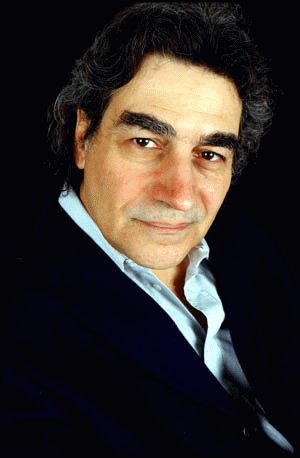A virus unsettles the nation … and, no, it’s not swine flu. Rather, it is a plague of pundits currently hardening our national arteries with a vast over-supply of ill thought-out yet deeply felt positions. Written, spoken, broadcast, blogged or tweeted, these messages are delivered by Americans who believe in their God-given right to express themselves, often at a decibel level inversely proportionate to a lack of understanding. Along this “pathway to punditry,†things have taken a turn from the merely annoying to the truly preposterous, witness Fox News’s feature, “Kid Pundits†as an exemplar of our mania to talk rather than listen.
“Pundit,†you may know, is a Sub-continental Indian term like “avatar,†“cheetah,†“coolie,†or “dinghy,†intellectual “loot†(another one) appropriated by British colonialists, and adopted into American English. “Pundit,†also written as “Pandit,†(as in Nehru) is an honorific for the learned Hindu advisors to judges during the British Indian Raj. “Pundit†grew to have a meaning similar to “maestro†of which America has had too few, our “maestro pundits†including Henry Adams, Walter Lipmann, Richard Rovere, Edward R. Murrow, Eric Sevareid, David Brinkley, William Safire, Daniel Schorr, George Will and few others. Except for the final two, all are pundificating from some far more literate place.
Today’s “pundi-monium†began early in the ‘00’s, as cable news networks began to saturate the TV screen with a hail of tyro-pundits. These “experts†were multiplexed, often Hollywood Squares-style, across the screen waiting their chance to out-elucidate their rivals to win the coveted opportunity to climb the “pundit pole,†garnering precious additional square inches of the television screen, until, finally, they are pundificating solo with Keith, Chris, Sean, Bill or Larry.
An important characteristic of what we might call, “The New Pundocracy†is the acceptance of the unalienable popular right to sound off on any topic, any time, and any place. The result of this rampant and ubiquitous punditry is that in a world of unedited, un-reflective, and ultimately self-cancelling blab, very little gets accomplished. Worse, it is now politically inopportune to question the “right†to say or write anything that flits across the brain-pan, leading us to the point where “freedom of expression†perhaps the Enlightenment’s greatest legacy, is now wrongly conflated to “all opinions are created equal.â€
Television news has provided a rich soup for miasmatic pop punditry. Instead of reportorial heavy-lifting, today’s TV journalist often seem content to poke their microphone under the nearest nose, and ask the sina qua non of innocuous news coverage; “how does it feel?â€
Innocuous question leads invariably to flaccid answer, like; “It’s a good experience for me,†“My family taught me to do the right thing,†“I’m here because I want everyone to know that my classmates are not criminals,†etc. These are the building blocks of personal punditry designed to turn the conversation away from any actual issue to the self-referential. In confessional America it is simply not enough to live a moral life. We also need to be a “role model†most especially for ourselves.
This “me model†of personal punditry comes clear during call-in radio shows or live forums where actual questions are simply bad form. Instead, the presenter is greeted by a personal manifesto in which audience members expound on how they personally experienced the book or movie in question.
It is television advertising that has done the most to establish this “Everyman a Pundit†era through what we might call “manifesto commercials.†Early among these was a series of ads by British Petroleum in which “average†Americans pundificate on their prescription for solving the environmental crisis. The question is asked: “What do you think cars will be running on in the future?†A woman in a shapeless orange t-shirt suggests “grass, leaves, trees, garbage.†“Hydrogen fuel cells†propounds a bike-toting earth-mother. “Give me that solar car and I’m there,†adds a twentyish Asian-American. “We really need to be conscious about what we put in our cars, just like what we put in our bodies,†states a college student, ponytail exiting back of baseball cap.
The BP ads set off a rash of “people as pundit†advertising that spread, like Mad-Ave H1N1. In ads for American Express, Aleve, DanActive, J.G. Wentworth, ScottTrade, the National Guard, Verizon, Gold Bond Powder, Bayer Aspirin, Playtex, and others, pundificating “real people†became star product pitchers. The irony is that these ads pretend that American consumers are the stars of their own television series, when real control and authority is evaporating faster than mom’s 401k.
Most recently, Internet-based social networking has struck a blow in the name of popular punditry. The inclusion of space for public commentary permits every bit of content on the web to chase its own tail, with ongoing, real-time commentary, often simply semi-illiterate rants that become permanently attached, like a malign conjoined twin, to the text of a story. Worse, the notion that everyone has a right to their own opinion has morphed into the notion that everyone has the right to their own facts.
There are several possibly remedies for America’ current Plague of Pundits. We might consider creating a “Pundit-Cap-in-Trade†market where opinions could be bought, sold, swapped and out-sourced. India, which gave us punditry in the first place, might be a particularly good market. We might also find ways to provide material for overworked TV pundits by pairing them with seasoned, out-of-work print journalist. These could fill in the news gaps at the same time reminding their charges of CBS’s Eric Sevareid’s 1977 sign-off in which he urged his fellow pundits, “to retain the courage of one’s doubt as well as one’s convictions.â€
###
Richard Rapaport is happy to pundificate at the drop of an opinion. He can be reached at rjrap@aol.com.

![]()
